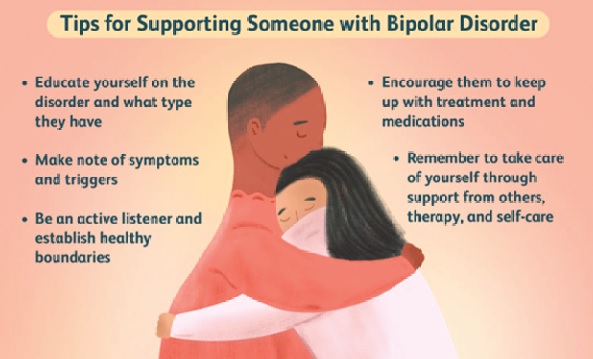Recently, a young female of school-going age confided in me and it was so revealing and touching. She said movingly, “I have bipolar disease. I can’t tell if I am ok now or not. I have had multiple sexual encounters with men."
"I make money from the practice. I and my friends roam the streets of Accra every night. We have had unprotected group sex many times. Even my parents benefited from the proceeds of my unsafe sexual escapades”.
Indeed, risky or unsafe sexual behaviour, especially among people who are not mentally stable is a matter of concern for families in particular and society as a whole.
Many empirical studies among female populations with bipolar disease found that the manic (hyperactive or overexcited) episodes of the disease compel female patients to engage in risky sexual activities.
Some men do take sexual advantage of bipolar patients. As such, the girl child suffering from bipolar disease needs family and societal support to prevent her from having unprotected, sexual intercourse which has numerous ramifications for the individual, households and society at large.
Accordingly, the impetus of this article is to discuss bipolar disease and its euphoric symptoms that lead to risky or unsafe sex, especially among female patients.
Risky sexual behaviour
Risky sexual behaviour includes unprotected intercourse, multiple sexual partners and illicit drug use.
Even though it is known that the use of alcoholic drinks and illicit drugs greatly increases the risk of gonorrhoea, chlamydia, trichomoniasis, hepatitis B, and HIV/AIDS, bipolar disease is also a main factor that can make a person engage in risky sexual behaviour, leading to these infections, unintended pregnancies and even death.
It is trite knowledge that high-risk sexual behaviour puts people at risk for sexually transmitted infections (STIs) and unplanned pregnancies.
Regarding risky sexual behaviour, teens and young adults, especially female children are at higher risk than adults.
If people with bipolar disease are highly vulnerable to risky sexual behaviours and unintended pregnancies, then what is bipolar disease?
Bipolar disease
Bipolar disease (formerly known as manic-depressive illness) is considered a treatable depressive disorder or illness which mainly makes the affected persons experience extreme and intense mood swings, which cause serious impairment in cognitive function.
These mood shifts can occur with changes in sexual desire, confidence or interpersonal relationships. These mood swings are different from the usual changes in mood that everyone experiences. According to the World Health Organisation (WHO), bipolar disease is the sixth leading disability in the world.
The condition typically starts in late adolescence or early adulthood, even though it can show up in children and older adults. People often live with the disorder without having it properly diagnosed and treated.
Cause
The exact cause of bipolar disorder is still unknown. However, possible risk factors could be hormonal imbalance, genetics, extreme trauma due to tragic incidents, drugs or substance abuse. Bipolar disorder can co-exist with other mental illnesses such as acute depression with psychosis or schizophrenia.
Symptoms
The symptoms of bipolar disease are influenced by the two cyclic phases or episodes of the disease. These are the manic (very high) and depressive (very low) moods, which may vary from person to person.
The symptoms associated with the manic episode of the disease include but are not limited to increased energy, euphoric mood, poor concentration, heightened sense of self-importance, extreme irritability, increased sexual behaviour and insomnia. The manic episodes usually lead to risky sexual behaviours.
Contrarily, the depressive episode of the disease also involves symptoms including but not limited to empty-feeling mood, feeling guilty, decreased energy, too much sleep (somnolence) and change in appetite.
These manic (high) and depressive (low) mood swings may persist for a few days or many weeks. The person may experience distinct episodes of mania and depression, and these episodes may switch rapidly, even multiple times in one week.
Treatment
Bipolar disease is a chronic condition that needs to be managed throughout a person's lifetime. Proper diagnosis and treatment can help a person lead a healthy and productive life.
A combination of medications, therapy and counselling (cognitive behaviour therapy) can be very effective in treating bipolar disorder. Treatment may vary depending on the age, medical history, severity of the condition or the person's tolerance to medication.
Not getting treatment or discontinuing the existing treatment or medication can actually worsen the condition or cause a relapse. In some cases, the symptoms may get triggered unexpectedly and the person may not even be aware of it or be able to control it.
Bipolar disease can negatively impact every aspect of the affected person’s life.
The affected person’s acceptance of the disease and learning as much as possible about it can help the patient cope with the condition. This is because denialism (refusal to accept reality) is inimical to the treatment of diseases, especially mental illnesses and STIs.
Conclusion
Bipolar disease is a brain and behaviour disorder characterised by severe shifts in an affected person's mood and energy, making it difficult for the person to function normally. People with bipolar disorder exhibit two sets of symptoms during the manic and depressive phases of the disease.
Many bipolar patients are involved in risky or unsafe sexual behaviours because of the clinical features of the disease and associated comorbidities.
Such unsafe sexual encounters expose them to sexually transmitted infections. Advisedly, bipolar patients need family and societal support. Stigmatising them is sinful and inhumane.
The writer is a Hospital Administrator
Email:afetikorto@yahoo.com

